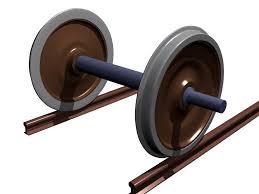记忆方法
1. axis => axle ( -le => diminutive suffix ) => 小轴,比较小的轴 => 车轴,轮轴。
中文词源
axle 车轴
来自PIE *aks, 轴。
英语词源
- axle
-
axle: [17] The word axle emerges surprisingly late considering the antiquity of axles, but related terms had existed in the language for perhaps a thousand years. Old English had eax, which came from a hypothetical Germanic *akhsō, related to Latin axis. This survived in the compound ax-tree until the 17th century (later in Scotland); tree in this context meant ‘beam’.
But from the early 14th century the native ax-tree began to be ousted by Old Norse öxultré (or as it became in English axle-tree); the element öxull came from a prehistoric Germanic *akhsulaz, a derivative of *akhsō. Axle first appeared on its own in the last decade of the 16th century (meaning ‘axis’, a sense it has since lost), and became firmly established in the early 17th century.
- axle (n.)
- "pole or pin upon which a wheel revolves," Middle English axel-, from some combination of Old English eax and Old Norse öxull "axis," both from Proto-Germanic *akhsulaz (cognates: Old English eaxl, Old Saxon ahsla, Old High German ahsala, German Achsel "shoulder"), from PIE *aks- "axis" (see axis). Found only in compound axletree before 14c.
权威例句
- 1. to weld a broken axle
- 焊接一条断裂的轴
- 2. The rear axle carries the greatest weight.
- 后轴负荷最重的分量.
- 3. Thus a wheel revolves on its axle.
- 于是,轮子在轴上旋转.
- 4. The axle doesn't work smoothly. It needs oiling.
- 轮轴发涩, 该上油了.
- 5. Frank abandoned his axle as the heat in it died.
- 由于车轴已经凉了,弗兰克扔下了它.
